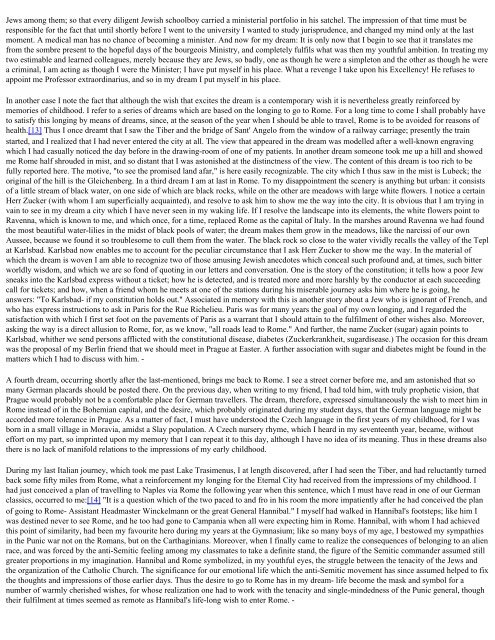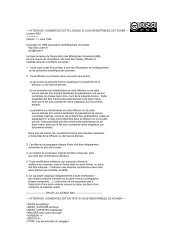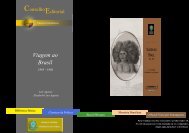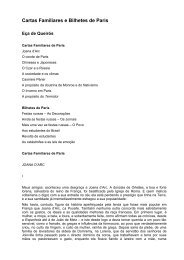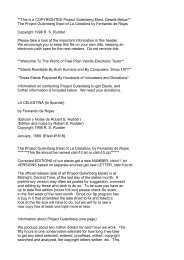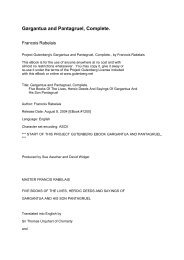The Interpretation of Dreams Sigmund Freud (1900)
The Interpretation of Dreams Sigmund Freud (1900)
The Interpretation of Dreams Sigmund Freud (1900)
You also want an ePaper? Increase the reach of your titles
YUMPU automatically turns print PDFs into web optimized ePapers that Google loves.
Jews among them; so that every diligent Jewish schoolboy carried a ministerial portfolio in his satchel. <strong>The</strong> impression <strong>of</strong> that time must be<br />
responsible for the fact that until shortly before I went to the university I wanted to study jurisprudence, and changed my mind only at the last<br />
moment. A medical man has no chance <strong>of</strong> becoming a minister. And now for my dream: It is only now that I begin to see that it translates me<br />
from the sombre present to the hopeful days <strong>of</strong> the bourgeois Ministry, and completely fulfils what was then my youthful ambition. In treating my<br />
two estimable and learned colleagues, merely because they are Jews, so badly, one as though he were a simpleton and the other as though he were<br />
a criminal, I am acting as though I were the Minister; I have put myself in his place. What a revenge I take upon his Excellency! He refuses to<br />
appoint me Pr<strong>of</strong>essor extraordinarius, and so in my dream I put myself in his place.<br />
In another case I note the fact that although the wish that excites the dream is a contemporary wish it is nevertheless greatly reinforced by<br />
memories <strong>of</strong> childhood. I refer to a series <strong>of</strong> dreams which are based on the longing to go to Rome. For a long time to come I shall probably have<br />
to satisfy this longing by means <strong>of</strong> dreams, since, at the season <strong>of</strong> the year when I should be able to travel, Rome is to be avoided for reasons <strong>of</strong><br />
health.[13] Thus I once dreamt that I saw the Tiber and the bridge <strong>of</strong> Sant' Angelo from the window <strong>of</strong> a railway carriage; presently the train<br />
started, and I realized that I had never entered the city at all. <strong>The</strong> view that appeared in the dream was modelled after a well-known engraving<br />
which I had casually noticed the day before in the drawing-room <strong>of</strong> one <strong>of</strong> my patients. In another dream someone took me up a hill and showed<br />
me Rome half shrouded in mist, and so distant that I was astonished at the distinctness <strong>of</strong> the view. <strong>The</strong> content <strong>of</strong> this dream is too rich to be<br />
fully reported here. <strong>The</strong> motive, "to see the promised land afar," is here easily recognizable. <strong>The</strong> city which I thus saw in the mist is Lubeck; the<br />
original <strong>of</strong> the hill is the Gleichenberg. In a third dream I am at last in Rome. To my disappointment the scenery is anything but urban: it consists<br />
<strong>of</strong> a little stream <strong>of</strong> black water, on one side <strong>of</strong> which are black rocks, while on the other are meadows with large white flowers. I notice a certain<br />
Herr Zucker (with whom I am superficially acquainted), and resolve to ask him to show me the way into the city. It is obvious that I am trying in<br />
vain to see in my dream a city which I have never seen in my waking life. If I resolve the landscape into its elements, the white flowers point to<br />
Ravenna, which is known to me, and which once, for a time, replaced Rome as the capital <strong>of</strong> Italy. In the marshes around Ravenna we had found<br />
the most beautiful water-lilies in the midst <strong>of</strong> black pools <strong>of</strong> water; the dream makes them grow in the meadows, like the narcissi <strong>of</strong> our own<br />
Aussee, because we found it so troublesome to cull them from the water. <strong>The</strong> black rock so close to the water vividly recalls the valley <strong>of</strong> the Tepl<br />
at Karlsbad. Karlsbad now enables me to account for the peculiar circumstance that I ask Herr Zucker to show me the way. In the material <strong>of</strong><br />
which the dream is woven I am able to recognize two <strong>of</strong> those amusing Jewish anecdotes which conceal such pr<strong>of</strong>ound and, at times, such bitter<br />
worldly wisdom, and which we are so fond <strong>of</strong> quoting in our letters and conversation. One is the story <strong>of</strong> the constitution; it tells how a poor Jew<br />
sneaks into the Karlsbad express without a ticket; how he is detected, and is treated more and more harshly by the conductor at each succeeding<br />
call for tickets; and how, when a friend whom he meets at one <strong>of</strong> the stations during his miserable journey asks him where he is going, he<br />
answers: "To Karlsbad- if my constitution holds out." Associated in memory with this is another story about a Jew who is ignorant <strong>of</strong> French, and<br />
who has express instructions to ask in Paris for the Rue Richelieu. Paris was for many years the goal <strong>of</strong> my own longing, and I regarded the<br />
satisfaction with which I first set foot on the pavements <strong>of</strong> Paris as a warrant that I should attain to the fulfilment <strong>of</strong> other wishes also. Moreover,<br />
asking the way is a direct allusion to Rome, for, as we know, "all roads lead to Rome." And further, the name Zucker (sugar) again points to<br />
Karlsbad, whither we send persons afflicted with the constitutional disease, diabetes (Zuckerkrankheit, sugardisease.) <strong>The</strong> occasion for this dream<br />
was the proposal <strong>of</strong> my Berlin friend that we should meet in Prague at Easter. A further association with sugar and diabetes might be found in the<br />
matters which I had to discuss with him. -<br />
A fourth dream, occurring shortly after the last-mentioned, brings me back to Rome. I see a street corner before me, and am astonished that so<br />
many German placards should be posted there. On the previous day, when writing to my friend, I had told him, with truly prophetic vision, that<br />
Prague would probably not be a comfortable place for German travellers. <strong>The</strong> dream, therefore, expressed simultaneously the wish to meet him in<br />
Rome instead <strong>of</strong> in the Bohemian capital, and the desire, which probably originated during my student days, that the German language might be<br />
accorded more tolerance in Prague. As a matter <strong>of</strong> fact, I must have understood the Czech language in the first years <strong>of</strong> my childhood, for I was<br />
born in a small village in Moravia, amidst a Slay population. A Czech nursery rhyme, which I heard in my seventeenth year, became, without<br />
effort on my part, so imprinted upon my memory that I can repeat it to this day, although I have no idea <strong>of</strong> its meaning. Thus in these dreams also<br />
there is no lack <strong>of</strong> manifold relations to the impressions <strong>of</strong> my early childhood.<br />
During my last Italian journey, which took me past Lake Trasimenus, I at length discovered, after I had seen the Tiber, and had reluctantly turned<br />
back some fifty miles from Rome, what a reinforcement my longing for the Eternal City had received from the impressions <strong>of</strong> my childhood. I<br />
had just conceived a plan <strong>of</strong> travelling to Naples via Rome the following year when this sentence, which I must have read in one <strong>of</strong> our German<br />
classics, occurred to me:[14] "It is a question which <strong>of</strong> the two paced to and fro in his room the more impatiently after he had conceived the plan<br />
<strong>of</strong> going to Rome- Assistant Headmaster Winckelmann or the great General Hannibal." I myself had walked in Hannibal's footsteps; like him I<br />
was destined never to see Rome, and he too had gone to Campania when all were expecting him in Rome. Hannibal, with whom I had achieved<br />
this point <strong>of</strong> similarity, had been my favourite hero during my years at the Gymnasium; like so many boys <strong>of</strong> my age, I bestowed my sympathies<br />
in the Punic war not on the Romans, but on the Carthaginians. Moreover, when I finally came to realize the consequences <strong>of</strong> belonging to an alien<br />
race, and was forced by the anti-Semitic feeling among my classmates to take a definite stand, the figure <strong>of</strong> the Semitic commander assumed still<br />
greater proportions in my imagination. Hannibal and Rome symbolized, in my youthful eyes, the struggle between the tenacity <strong>of</strong> the Jews and<br />
the organization <strong>of</strong> the Catholic Church. <strong>The</strong> significance for our emotional life which the anti-Semitic movement has since assumed helped to fix<br />
the thoughts and impressions <strong>of</strong> those earlier days. Thus the desire to go to Rome has in my dream- life become the mask and symbol for a<br />
number <strong>of</strong> warmly cherished wishes, for whose realization one had to work with the tenacity and single-mindedness <strong>of</strong> the Punic general, though<br />
their fulfilment at times seemed as remote as Hannibal's life-long wish to enter Rome. -


